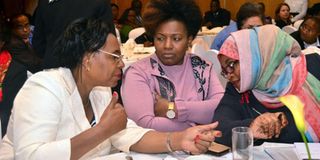EAC states explore ways to tame cross-border FGM

From left: Ministry of Public Service and Gender officials CS Prof. Margaret Kobia, CAS Rachel Shebesh and PS Safina Kwekwe during a meeting at a Nairobi hotel in September last year, ahead of the 12th Commonwealth Women Affairs Ministers meeting (12WAMM).
What you need to know:
- Gender Cabinet Secretary Prof Margaret Kobia leads her counterparts from Eastern Africa in an inter-ministerial meeting on ending cross border FGM.
- Gender ministry CAS Rachel Shebesh pushes for speedy action by the East African Legislative Assembly (EALA) to ensure commitment to end cross-border FGM is achieved through legislation.
- The cross-border practice is common in the East Africa region, in particular in Ethiopia, Kenya, Somalia, Tanzania and Uganda.
Cross-border Female Genital Mutilation (FGM) has been a thorn in the flesh for the East African Community (EAC) member States for decades.
Despite some countries such as Kenya enacting stringent laws to contain the vice, it continues unabated with circumcisers taking advantage of the porous borders.
For instance, Kenya has witnessed a growing trend in cross-border FGM where girls and women are taken to Uganga, Tanzania, Ethiopia and Somalia for the cut, as perpetrators attempt to circumvent the laws put in place to end FGM.
Survey findings
Findings from a report commissioned by Unicef in collaboration with Kenya's Anti-FGM Board shows that 70 per cent of respondents of the survey from Uganda, and 60 per cent from Ethiopia also travelled to Kenya to undergo the cut.
It is for this reason that a high-level inter-ministerial, cross-border meeting on ending FGM during and post Covid-19 pandemic was held recently.
During the meeting, Kenya, through the Gender Ministry CAS Rachel Shebesh pushed for speedy action by the East African Legislative Assembly (EALA) to ensure commitment to end cross-border FGM is achieved through legislation.
Ms Shebesh also stressed on the need for all the countries in the region to have FGM laws in place in order to contain the harmful practice that has seen millions of girls and women in the region undergo the cut.
The CAS also called for the implementation and operationalisation of FGM legislative frameworks by the respective EAC countries in order to ensure progress is made in ending the outlawed practice.
Tremendous progress
She observed that Kenya has made tremendous progress in the fight against FGM through the enactment and enforcement of the National Police on the Eradication of FGM, 2019 and implementation of multi-sectorial approach to eliminate the vice.
“Our President last year made a commitment to end FGM in Kenya and beyond its borders by the year 2022.We are now implementing them presidential directive by engaging the community through the law enforcement officers to abandon the practice,” she said.
Ms Shebesh assured the government will not rest until it puts to an end to cross border FGM by imposing tough penalties on perpetrators and those betting the practice through the boarder.
Uganda’s Gender and Labour Minister Peace Mutuuzo regretted that many girls are being cut due to hiding of information and poor reporting at all levels.
Ms Mutuuzo emphasized on the need to strengthen collaboration with the neighbouring countries to ensure timely intervention in the fight against the cut.
“FGM is one of the worst forms of violence against women and girls. We shall remain vigilant on the changing trends on the medicalization of the cut,” she said.
UNFPA Deputy Regional Director for Eastern and Southern Africa Office, Justine Coulson commended the EAC region for setting the pace to show how cooperation is important to end cross boarder FGM.
She added a study has revealed that most cases relating to child marriages and FGM are interlinked amongst the cross-border communities.
The high level inter-ministerial meeting comes after EAC countries in April last year signed a declaration to eliminate cross-border FGM.
Emerging trends
Public and Gender Cabinet Secretary Prof Margaret Kobia led her counterparts from Eastern Africa in an inter-ministerial meeting on ending cross border FGM.
The ministers signed a pact in Mombasa after a two-day conference that brought together anti-FGM crusaders and experts from Somalia, Ethiopia, Uganda, Tanzania and Kenya.
Participants discussed ways of tackling the emerging trend of cross-border FGM, where communities advancing the practice cross national borders to seek or carry out FGM in neighbouring countries.
Prof Kobia said Kenyan authorities are worried that the country is a soft spot for carrying out cross-border FGM. She said the government will embolden its resolve and tactics to stamp out the practice.
Prof Kobia said the recommendations derived from the conference will be vital in ending the practice and she will ensure their full implementation.
"It is now time to seal the gaps and translate our commitments to results. I urge each of the member states within the region to take specific deliberate measures to implement the adopted action plan," she said.
UNFPA Kenya representative Ademola Olajide who also spoke during the meeting said the five countries account for almost a quarter of the global number of women and girls who have undergone FGM, which he described as a significant burden to carry for developing economies.
The cross-border practice is common in the East Africa Region, in particular in Ethiopia, Kenya, Somalia, Tanzania and Uganda, where there is still a high prevalence of FGM.
These countries share borders and have, in some areas, the same communities and ethnic groups, which leads to cross-border practices of FGM.





